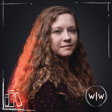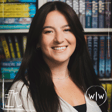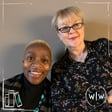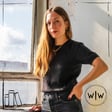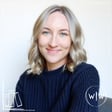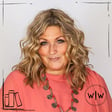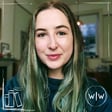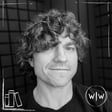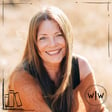Become a Creator today!Start creating today - Share your story with the world!
Start for free
00:00:00
00:00:01

#183 - Emily Layden
Author and screenwriter, Emily Layden is on the podcast this week to chat about her new novel, 'Once More From the Top', her journey to becoming an author and the differences between writing novels and writing for film and television. (Photo by Michelle Lange)
💖 Join the Patreon 🙏
Support the show and get access to the extended cuts early and ad-free!
📚 The Chosen Ones and Other Tropes 🥳
Jamie, Melissa and Noami talk about all things writing, tropes and publishing!
✍️ WriteMentor 🧑🏫
Get a whole month with WriteMentor's Hub for free using the coupon code 'Write&Wrong'.
🎙️ Zencastr 🎬
Click on this referral link to get 30% off your first three months with Zencastr.
Transcript
Introduction and guest background
00:00:00
Speaker
Ooh, a spicy question. I love it. Because the writing is sort of everything. You can fix plot holes, but if the writing... So some readers love that and some readers are like, but I wanted more of this. So it's kind of a gamble. Hello, and welcome back to the Right and Wrong podcast. Joining me on this episode all the way from New York City is screenwriter and author Emily Layden. Hello. Hi. Thanks for having me. Thanks so much for
Discussion of 'Once More From the Top'
00:00:27
Speaker
coming. um I would like to keep these episodes off with ah the latest publication, which for you is, once more from the top, out in the UK on August 1st. Tell us a little bit about it.
00:00:39
Speaker
So ah once more from the top, really started with my fascination with contemporary fame. um It is about a pop star named Dylan Reed, whose childhood best friend disappeared when they were both in high school. 15 years later, when Dylan is at the peak of her career, that best friend's body is found at the bottom of their hometown lake, forcing Dylan to kind of re-examine her career, their friendship, and whether there's more to their story than meets the eye. So sort of cold case kind of energy, but intertwined with like a contemporary look at what celebrity and fame really is. Yes, exactly. it's ah Yeah, true crime meets, you know, Daisy Jones.
00:01:28
Speaker
What was it about? Because it is such a fascinating sort of cultural moment being a celebrity at the moment and like fame and like what it does to a person. What was it about kind of that specifically that made you want to write about an investigator?
Challenges of female celebrities in social media age
00:01:42
Speaker
I think that what I'm what feels particularly noteworthy about contemporary celebrity and and probably in particular contemporary ah female celebrities is um the kind of the the closeness or our perceived closeness to them, right? I think that um famous women in particular have to walk this kind of necessary tightrope between
00:02:17
Speaker
aspirational and accessible. And that tension, um which is obviously in large part cultivated by social media and our expectation that we will um have constant access to the, quote, real lives of our celebrities, um that tension is was really, really interesting to me. Yeah, it is it is fascinating because I guess from the outside looking, you can't really take anything at face value that you see on television or in the newspapers or something like that because even if it is in part like true, that's what they did. It's a character, right? Any kind of celebrity, if they're outside, it's kind of just one of their kind of many masks that they're wearing.
00:03:02
Speaker
Sure, it's a persona. um yeah and And yet we are all sort of engaged in this charade, right? That um that that what what they are giving us you know, when they show us photos of their dressing room or, you know, um messy ah dining table shots of their children, like that we're getting their real selves. And maybe we are, or maybe feeding that desire is just also part of the persona, you know?
00:03:40
Speaker
Yeah, yeah, yeah. And I guess, you know, how many celebrities actually run their own Instagram account? Of course, of course.
Research process for authenticity in writing
00:03:47
Speaker
So who really knows? um And obviously the last but large part of this novel is also that the the the protagonist is a musician with a successful career. Are you a musician? I am not.
00:04:01
Speaker
But I don't like admitting that. right Sorry, I've exposed you. No, exactly. I'd be right. Being ah a huge part of being a writer is feeling like an imposter all the time. um But ah i'm I'm not a musician, but I am an excellent student. And okay so I ah really the most fun part of this book was the research for me. um I just really spent as much time as I could with any yeah producers, musicians, songwriters, poets, anyone in the industry who would speak to me, who would let me into their studios, who would let me watch them play, would talk to me about their songwriting process, that was really, really fun for me.
00:04:47
Speaker
Oh, that's cool. So do you literally just kind of like go online, look at a list of people and just say, right, I'm just going to start emailing people and see who would be interested in getting work? I did a little bit of that, but I was lucky to sort of have a few people in my kind of immediate network okay who got me going and then could say, you know, I know this person or why don't you talk to this person or why don't you go to this studio? And that sort of, that helped a bit. Okay, I'm guessing you needed like one of the sort of um industries where people could have this larger than life sort of celebrity persona attached to them. Was music something that you just you could you thought was kind of like the most interesting or did you did you kind of look into maybe doing an actor or something else?
00:05:36
Speaker
Yeah, so I i think I always wanted to write about the leakiness of artistry and memory. So I knew ah you know i knew this was always going to be an art book, right? And um i I don't know if I will ever write a book about ah a novelist. So that was right that was off the list immediately. um and But songwriting felt the closest to me and that I know what it is to be a writer, right? I have some i have some working knowledge about the process there. um And that felt like a great starting point. Plus, yes, of course I am.
00:06:20
Speaker
like everybody else. I am a music fan. i am i i like I love music. I love pop music. I love country music. um So it's it's it is the arena where I felt like I had some working knowledge because I know how a writer's brain works. But I also had a real hunger to understand more about the process because the intersection of lyrics and melody is something that felt really mystifying to me when I was starting this, and I wanted the chance to know about that.
00:06:54
Speaker
Yeah. Yeah. Okay. That's really interesting. It's interesting that you did kind of like someone that very much does a lot of research for this.
Inspiration from teaching experience
00:07:01
Speaker
I'd love to dive back a bit into your, this is your second novel, your debut novel, All Girls came out in 2021 and that's set in an All Girls prep school. So what was your research process for that? My life. so it might be and so i ah I spent most of my 20s teaching at girl schools. um And so I did not go to a girl school myself. I'm, ah as we say here in the US, I'm a public school kid. um But I then taught at girl schools. I taught English at um a couple of girl schools in my 20s and was just day in and day out in this environment that as a young person, I had found
00:07:44
Speaker
really fascinating and kind of you know um ivory tower-esque or a like something I wanted to peek behind the curtain of, and then suddenly I was i was in it. I was a part of it. um And it's so rich. It is just you know prep schools are sort of evergreen for literary material um for a reason. Yeah, yeah, yeah. Okay, no, I was just curious because it did sound like something that would have been harder to read. I don't know if a school would appreciate you just reaching out and saying, can I come and hang out? Can I just implant? Yeah, yeah. Would that be okay? So as I said, this is the second novel.
Pressures and confidence in writing second novel
00:08:25
Speaker
Always talking to authors, there's kind of a common recurring theme people say is like the second book is often
00:08:32
Speaker
um i would I don't want to say harder, but like it comes with a whole new set of challenges. How did you find writing this second novel versus when you wrote the first one? Yeah, it's so true. The state the stakes felt much higher because because this is my job now. When I was writing All Girls, I was writing i wrote that novel every day from 5-6 AM before going to teach. I didn't have an agent. I didn't have an editor. I didn't have anyone waiting for it but myself. It was just for me. And it was just a dream that I would one day get to do this thing, quote, for real, right? um And then all of a sudden I did. I got the book deal. I, you know, I i got the TV development deal. I had suddenly I had
00:09:22
Speaker
agents, editors, lawyers, like um a whole team of people behind me. And it was, I left teaching, it was my livelihood. And the desperate desire to keep that going, I felt that really acutely um while writing the second one. Yeah, I think that's the, it's you don't really appreciate it once you're until you're there. And then you realize that, yeah, you had this sort of strange freedom of it just being a kind of dream when you were writing the first one. And now it's, like you say, there's people waiting for your next chapter, waiting for your next draft. There's a schedule, everything's on on on timing, stuff like that. Yeah. Yeah.
00:10:03
Speaker
yeah having experienced the publishing machine already, let's say. um Did it make things smoother this time around though? I think I felt a confidence that I did not feel the first time. you know i' i I would probably be embarrassed to go back and read some of the emails I sent my agent in the beginning of All Girls. um i I was so nervous. i was you know ah Everything I said was just like filled with thank yous and I'm so grateful, which I am, but and I'm sorrys and just like classic. like I'm tripping over myself to
00:10:41
Speaker
feel, to to show you guys that I'm not sure I even belong here, but thank you so much for letting me be here. ah And ah this time around, I felt um just much more, much more certain of if If I am still plagued by some sort of existential um anxiety about my belonging, which i I think a lot of writers are, I at least i at least ah and know how to act the part of it better. um
00:11:15
Speaker
and i And I am more comfortable, you know, I've been with my agent for ah five years now. um I have been with, or both of my, I've been with and my um my film TV agent as well. Like I just have, I have a team of people I really trust. I i understand, I feel, I feel shored up and assured in a way ok you can't possibly feel in the beginning.
Advice for debut authors
00:11:40
Speaker
Yeah, okay. Well, if you could give advice to debut authors kind of going through the process for the first time, what advice would you would you give for them?
00:11:48
Speaker
Hmm, that's a great question. um And you teed that up so nicely with my with last one. um i I think I would say, you know, I was actually just talking to one of my friends who who had her debut out Daisy Garrison, Six More Months of June, it's wonderful. um That came out in June. ah And I was talking to her about the, she was sort of, she won't mind me saying this, just sort of like, nervous about a thing. And um i I said to her like, oh, I i i sent i send anxious emails like that all the time. Don't worry about it.
00:12:30
Speaker
and And I think it's just that. I think it's just having a little bit of grace for yourself in as in the you know in the first year or two of of this career. you don't know You don't know what's up and that's okay and you're not supposed to know. And I find i feel like I got a lot of advice. I think and Hollywood in particular, you sort of get the advice that's like, act like you belong. And that only made me feel like it wasn't okay to ask questions. Like I was always supposed to know the answer. um So what I would wanna hear is that like, it's okay to ask questions and it's okay if you mess up and you um and just be patient with yourself as as you're learning.
00:13:25
Speaker
Yes. I mean, it's easy to forget that nobody's born with this sort of innate knowledge of how everything works. Right. Right. Right. Right. Exactly. Exactly. And you mentioned um Hollywood and and kind of your work as a screenwriter. So you have a literary agent and ah a separate agent for for television stuff. Yes, correct.
Transition to screenwriting and adaptation
00:13:49
Speaker
Yep. i have um a I have a literary agent and then a film TV agent, two film TV agents. um And I also have managers now as well. Wow. You've got a whole entourage. because It's a lot. It only adds to the pressure, but. So how long have you been doing the screenwriting for? So when so all girls was a really um
00:14:16
Speaker
I was really fortunate and and it was both my dream and it and my life changed literally overnight. we sold We sold the novel overnight and I was on the phone. I had a i had and was lined up with a film TV agent immediately and then I was on the phone with producers the following week. um wanted to Who wanted to option the novel? um And I was really fortunate in that that film TV agent, Hilary Michael at WME, I said that I, having no experience besides like some screenwriting courses in college, that that i wanted to adapt my I wanted to adapt my novel. um And Hilary was just like, yeah, absolutely. We will, I will fight for that for you. um And she was, you know, she found me producers,
00:15:07
Speaker
who supported that. And I was really lucky to work with Jessica Rhodes of, um you know, Black Mirror, Station Eleven. um And Jessica's just a fantastic, she's fantastic at what she does. She was a great mentor. um And she, most of all, she trusted that I could learn and I could learn fast and I could do it. um And so I've been kind of doing development work ever since. On all girls. ah So we we developed All Girls and then um it didn't you know it didn't get the green light as as happens to most things. yeah um ah But I have a few other other projects going as well right now. Okay. That's really cool. As someone who has now written and continues to write in both mediums, how different do do you find kind of working and in but novels versus working in writing for television and screen?
Influence of screenwriting on novel structure
00:16:05
Speaker
Yeah, it's so different. um But i think that I think that screenwriting has given me, so in and screenwriting, structure is really king. And that is not an approach I had as a novelist. um But I think that learning that as a screenwriter, I think you can see that in Once More From the Top. um I think there's an attention to structure in Once More From the Top that um only happened because I'd spent the preceding, whatever, two or three years um learning to become a screenwriter. Okay. So it kind of bled into your novel writing as well. Yeah. learn skills though yeah That's interesting.
00:16:56
Speaker
Yeah, and of course I think novelists have an attention to um character development, not that, you know, TV writers don't, but that that was a skill, um a comprehensive attention to character development that I i could bring to screenwriting. Oh, I see. Yeah. Cause I guess screenwriting, especially for television, I would imagine is it a lot more focused on the arc and the episode to episode arc.
00:17:27
Speaker
It's so plot-based, yeah. Yeah, plot-based, that's what I'm saying. Interesting, okay. So I had an interesting thought, um if maybe maybe you you could give some insight into this. Again, I'm going to ask you to like offer some advice. If someone was coming from writing novels, long-form prose, et cetera, what advice would you give them if they wanted to move into screenwriting?
Adapting novels to screenplays
00:17:53
Speaker
Industry advice advice? ah probably both. I mean, both would be great. Okay. So, so I think, creatively, you can't be precious about
00:18:09
Speaker
your, if you're adapting your own work, um you can't be precious about your source material. I think that you have to sort of see it as you see the novel as clay that necessarily has to be reshaped to fit the demands of of the of the new form, of whether that's television or or film. um And so being playful with your material is really, I think is really, really important. And you have you just have to hold it loosely. um And then I think
00:18:47
Speaker
Similarly, what I love about writing for television is how collaborative it is, right? Writing a novel is very lonely. um it's It's mostly just you and your computer or whatever. Maybe you are one of those people who writes on hand, but it's mostly just you and the page and your brain. And television and film are not like that at all. there are You have producers, um executive studio executives, you might have show runn you might have a showrunner, you um there you might have other attached talent who gets to provide feedback on your scripts. There's just a ton of people involved in your writing process. And
00:19:35
Speaker
while that could could maybe sound like not so awesome because maybe writers don't love getting notes all the time.
00:19:45
Speaker
it is it is actually it is It can really be an opportunity, right? like it When you're stuck, if you have a great producer, you just call them and say, hey, I don't know what to do about this scene. um Let's talk it out. And that's ah that's wonderful, right? You don't have to sit on your own for a day or weeks trying to puzzle it through. You have a resource. And that I love that about it. Okay, yeah.
Daily writing goals for screenwriters
00:20:11
Speaker
And then conversely, if someone was coming from screenwriting and wanted to move into writing a novel, what advice would you give them?
00:20:20
Speaker
ah so
00:20:24
Speaker
So... I feel like it's a really difficult two-part question. No, that is a difficult question because I... So... I do have some some screenwriter friends who would like to write a novel, and I think what they find challenging about it is the sheer volume of of words that you have to put down. um and it just you know you can You can definitely spend a year writing a pilot episode of television, absolutely. um But I think that it feels daunting to a lot of screenwriters, just the number of pages that have got to go down to make a book. um And so I would say that what I find helpful in both fields is
00:21:15
Speaker
like a measurable writing goal every day, that is that is a way that I think like I've been able to sort of feel productive in both fields um while like to sort of, I guess what I'm trying to say is that I apply there, I needed a way to apply my approach to fiction writing, to screenwriting and i So i needed um I needed to find a way to translate my rhythm, and I would say that screenwriters should do the same thing when they're looking to write a novel, and then the task will feel less daunting. okay yeah ah Does that make any sense? I can make that a little more tangible if we want. No, I get it. okay okay as you know A simple thing would be like, okay, you just say yourself a word limit. me You say, I'm going to do 2,000 words a day, and then in a month and a half, we'll have a novel.
00:22:11
Speaker
Yes. And so that, right, exactly, right? Like, if you're if as a screenwriter, you say, I'm going to write five pages a day. what's ah what's the What is the same amount? What is not the same word count, but what's like a similar like percentage of the percentage of the project. Exactly. Exactly. Okay. That's pretty interesting. Those were great. I sorry to throw you off a bit with this question. um We're going to head over to the desert island right now. So Emily, if you were stranded on a desert island with a single book, which book do you hope that it would be? This is actually a really easy answer
Favorite book for a desert island
00:22:50
Speaker
for me. um It's Gone Girl.
00:22:53
Speaker
oh I love Gone Girl. I've read it. I've read it many, many times. um Amy Dunn is one of my all-time favorite characters. um And I think Gillian Flynn is absolutely brilliant. um And there there is... i don't I don't think I could read that book enough times, actually. How many times have you read it? I have no idea. I have really no idea. You lost count.
00:23:24
Speaker
And I pick it up as a reference to just sort of, you know, um it's it's one that stays close to my desk and and I'll just want read a passage here or there or be like, how did she pull off? um Everything about that book works. the It's so excellently, the mystery is so well plotted. The characters are so sharply developed. The twist, the fact that she wrote a book with a wild twist. The fact that you wrote a book with a twist like that, and you could go see the movie and still be on the edge of your seat, right knowing what was coming, that is a remarkable feat. And that speaks to um how well she has done every single aspect of that book.
00:24:20
Speaker
Yeah, absolutely. And I mean, that twist, not just from a like narrative perspective, from like a writing craft perspective is even crazier. Because it's like, you're changing POV of the character. It's wild. Right. You would think it took I think real genius for her to believe, for her to have the vision to do that, because I think most writers would say, I'm not allowed to do that. Yeah, absolutely. And she just did. And bravery from the editor as well to say, this is going to work. We're going to make this work. Yes. Yeah. Yeah.
00:24:58
Speaker
Yeah. I mean, it's that book I think is is so largely the reason that psychological thrillers are such a commercially successful genre right
Conclusion and farewell
00:25:08
Speaker
now. like Absolutely. It changed the industry. Yeah, absolutely. yeah Amazing. Great choice, great choice. I'm going to ask some more questions about starting out in publishing, getting an agent, rising processes, and a bit about book deals, but that will be in the extended episode exclusive to my amazing Patreon subscribers. that yeah um Amazing. That's a fun, that's a better place to end this episode. Yeah, I think so too. Thank you so much, Emily, for coming on the podcast and chatting with me and telling me all about your, your writing and and the books. It's been really, really fun and and interesting chatting with you. Oh, thank you so much for having me. Likewise.
00:25:45
Speaker
And for anyone listening, once more from the top is, is it'll be out as of this airing August 1st in the UK, so you can go and get it in all the usual places. If you want to keep up with what Emily is doing, you can follow her on Instagram, at emilyladen, or you can find her website, emilyladen.com. To support the podcast, like, follow, and subscribe on your podcast platform of choice, and follow along on socials. Join the Patreon for extended episodes ad-free in a week early, and check out my other podcast, The Chosen Ones and Other Tropes. Thanks again to Emily and thanks to everyone listening. We will catch you on the next episode.


